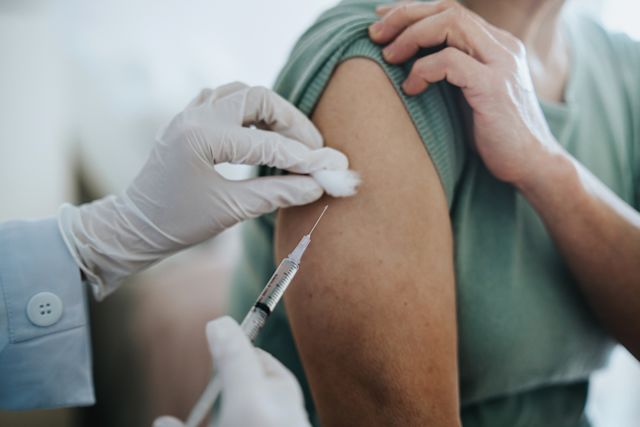Updated on September 24, 2024.
For many middle-aged and older adults, the itchy rash caused by chickenpox is a distant childhood memory. But chickenpox has a ghost of sorts, one that can haunt you decades later: a painful rash called shingles.
Up to one out of every three people will develop shingles, also called zoster or herpes zoster, during their life. This painful condition is especially common after age 50, which is why the Centers for Disease Control and Prevention (CDC) recommends that everybody aged 50 and over get vaccinated for shingles. The vaccine can reduce your risk of the disease.
Here’s what you need to know about the shingles vaccine, plus tips on when to schedule yours.
What is shingles?
Shingles is caused by the reactivation of the chickenpox virus, called varicella zoster.
“Most individuals are exposed to the varicella zoster virus as children and develop a widespread rash known as chickenpox,” explains Vinod Nambudiri, MD, an internal medicine doctor and dermatologist with Brigham and Women's Hospital/Dana-Farber Cancer Institute in Boston. “The chickenpox rash is characterized by tiny, fluid-filled blisters or vesicles, which appear all over the body. After the chickenpox infection clears, the virus stays dormant in your system.”
The varicella zoster virus may reactivate later in life for a number of reasons—if you develop a weak immune system from a condition like HIV or leukemia, for example, or if you are under a great deal of stress. Older age and certain medical conditions and drugs can also increase the risk.
With shingles, the same fluid-filled blisters show up again, but they usually appear in a band-like formation and stay confined to one side and one area of your body. When the blisters open, the virus may spread and cause chickenpox (and possibly shingles, years later) in other people who are not immune to it.
Pain is the number-one shingles symptom, but it may also cause fevers, body aches, headaches, and chills. Even after your symptoms resolve, it’s common for nerve pain, called postherpetic neuralgia, to linger in the area where the rash had been.
Other shingles complications include:
- Eye involvement, which can cause vision loss
- Bacterial infection of the rash
- Nerve damage
- Potential damage to other organs, including the brain, lungs, or liver
Why is it so important to get the shingles vaccine?
Getting vaccinated reduces your risk of shingles by over 90 percent and limits the severity of shingles if you do develop it. For example, the vaccine cuts your risk of postherpetic neuralgia by more than 90 percent.
Still not convinced you should get vaccinated? By preventing a shingles outbreak, you also avoid spreading varicella zoster to other people who are at risk for life-threatening complications. These groups of people include:
- Pregnant people who aren’t immune to varicella zoster
- Newborn babies
- People with a weak immune system or those undergoing cancer treatment
Who should—and should not—get the shingles vaccine?
People over age 50 should get vaccinated, whether or not they’ve already had chickenpox. If someone has already had shingles, they should receive the vaccine as well, since some people may experience more than one outbreak, Nambudiri explains.
A highly effective two-shot shingles vaccine called Shingrix was approved in 2017. The CDC recommends that you get it even if you received the previous shot, called Zostovax, which is no longer available in the United States.
People with asymptomatic HIV who are aged 50 or older should get Shingrix. It is also approved for use in other immunocompromised adults, including people undergoing cancer treatments.
People who shouldn’t get vaccinated include anyone who:
- Has had a severe allergic reaction to any part of the vaccine, or to a dose of Shingrix itself
- Is pregnant or breastfeeding
- Currently has shingles
“Anyone with allergies to prior vaccines should be sure to tell their physician before being vaccinated for shingles,” Nambudiri adds.
Does the shingles vaccine have any side effects?
Many people have some soreness or irritation at the injection site, and some will have a headache or muscle pains. These side effects usually last only a couple of days.
How can you get vaccinated?
Ask your healthcare provider about the shingles vaccine at your next appointment if you’re 50 or older. They may administer it in their office or refer you to a pharmacy or clinic. In most people it is given in two doses, 2 to 6 months apart.
If your insurance doesn’t cover it, you can contact the vaccine manufacturer, called GlaxoSmithKline, to request financial assistance to cover the cost. Coupons may be available as well.






